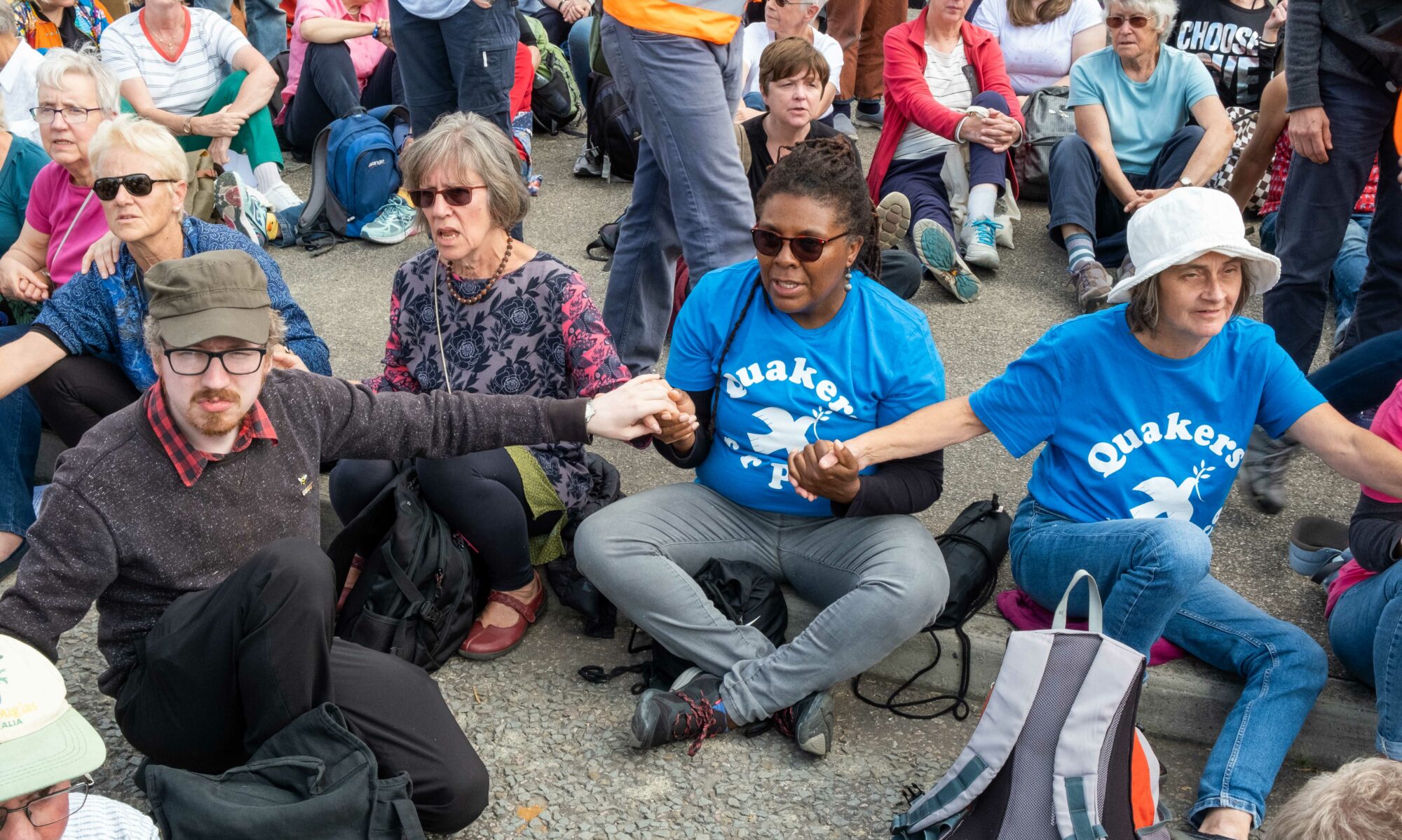Many thanks to Anna for speaking at our event The Human Cost of War on 19th July. You can read Anna’s reflections below, based on her research and teaching about war and the arms trade at the University of Sussex . The video of our speakers is also available.
Thank you Robin and Quaker Roots for the invitation. And thank you Burhan, Salih and Sukaina for sharing your experiences of war.
I would like to make three points about the UK arms trade and its role in war: first, what drives the UK arms trade; second, the limits of export controls; and third, the importance of direct action.
What drives the UK arms trade
What drives the UK arms trade is a combination of state geopolitical interest plus the close relationship between the state and arms industry. By that, I mean the deep commitment across the British government and establishment – across both Conservatives and Labour – that Britain should try to remain a great power and have the military might to be one. This is combined with the deep, entrenched relationship between the state and arms companies. The arms industry’s interests are represented within the state: there is a government body dedicated to promoting arms exports. Called UK Defence and Security Exports (note that they don’t call them arms!), this body provides support to companies to advertise at arms fairs like DSEI: they offer help with government-to-government relationships, bilateral meetings, VIP programmes, presentations on what the weapons can do.
And beyond this immediate support for companies to hawk their wares, the preparation for war is paid for by taxpayers. BAE Systems, the UK’s largest arms company, routinely portrayed to us as contributing to jobs and the economy, pays less than 15% of its own research and development. The rest is paid by the state. So the costs are socialised – but the profits are privatised. And the arms industry is increasingly owned by major asset managers and investment funds, whose returns flow to wealthy individuals, pension funds, and foundations. At the time of a cost of living crisis, if the plight of our darker skinned friends doesn’t move us, the hit on our pockets just might.
The limits of export controls
The second thing I’d like to share is about the limits of UK arms export controls. On paper, the controls are clear that the government will not allow arms exports where there is a clear risk they might be used in a serious violation of international humanitarian law. But we have seen direct evidence of the misuse of UK-supplied weapons. To give you an example from my home town, Brighton: a fragment of a guidance system for a bomb, with the markings of the EDO factory up the road, was found at the site of an airstrike on a factory in Sanaa, Yemen. The UN Panel of Experts concluded it could only have been dropped by the Saudi led coalition and that it was a likely violation of international law.
But it’s more than simply a case of the controls not being worth the paper they are written on. The government – again, whether Conservative or Labour – makes great play of its controls. They use them to justify and legitimise British involvement in the arms trade. Ask the government pretty much any question you like about its arms exports, and the answer you will always get is that the UK has one of the most robust arms export control regimes in the world. That’s why Campaign Against Arms Trade took the government to court about its arms exports to Saudi Arabia – three times. The first time, the High Court found in the government’s favour, on the grounds that government policy was legally rational. That doesn’t mean it was a good policy, but that it was rational in narrow legal terms. The second time around, when CAAT appealed, the government was found to have not even tried to conduct a meaningful risk assessment of the past use of weapons and told it had to stop issuing licences to Saudi Arabia. The government amended some other licences to ensure that companies could carry on transferring weapons under licences that had previously been grated; and conducted a whitewash internal review saying that any violations were isolated incidents, and couldn’t be said to constitute a pattern. So CAAT took them to court again. The decision was released last month – disappointingly, although perhaps not surprisingly, it found in favour of the government. Again, the decision was on the narrow grounds of legal rationality.
The importance of direct action
Which takes me to my final point: the necessity and urgency for direct action against the arms trade. We are far beyond the point of saying, we should write to our MP; you should join a campaign group (although these are, of course, good things to do!). NGOs and specialists have been trying to engage with MPs, officials, those who have the power to change things from within, for years, trying to hold them to their commitments. The strength of the controls, such as they are, is largely down to NGOs in the British arms transfer control community. We cannot rely on the law to protect the right – the law protects the powerful. And the government is committed to exporting weapons when it deems it in its interest, regardless of the consequences. This runs alongside an increasingly racist and violent orientation towards migrants, asylum seekers and refugees – the latter often being the very people who are displaced by the wars facilitated by UK- supplied weapons.
To my mind, the significance of direct action is solidarity – not sympathy. The public outpouring of support for Ukrainians fleeing war has been both wonderful and troubling. When faced with people widely understood by white Britain to be “like us” and feeling from a familiar foe, Russia, people get it. But where has that widespread support been for Syrians, whose war couldn’t have been conducted without Russian support, and for Sudanese and for Yemenis? In this country, racially minoritized people experiencing and escaping conflict are portrayed either as terrorists, who need to be punished; or as interchangeable, often starving, poor brown and black people, often children, who deserve sympathy at best. Too rarely are they portrayed as political agents and actors with whom we could act in solidarity. The UK is caught up in crises over Brexit, the cost of living, Tory drama: it is not obvious that there is a social force of solidarity. It is up to us to show otherwise.
Text delivered at Quaker Roots event, ‘The Human Cost of War,’ 19 July 2023
Anna Stavrianakis, University of Sussex, A.Stavrianakis@sussex.ac.uk

